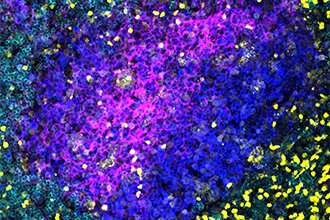Anti-viral immune discovery could lead to better vaccines

Walter and Eliza Hall Institute researchers have identified a molecular switch that impacts immune responses to viral infections, and whether or not protective antibodies are produced.
The team also made the surprising discovery that the immune system protects against different viruses via distinct pathways. Their findings could lead to better strategies to develop vaccines for previously hard-to-prevent viruses.
The research, led by Dr. Joanna Groom and Ph.D. student Ms Amania Sheikh, was published today in the journal Cell Reports.
Molecular switch
Our immune system comprises a complex network of cells and signalling molecules that can produce a range of responses to infections, Ms Sheikh said. "Immune T cells are critical for coordinating specific immune responses, recruiting other cells and directing how we respond to different microbes such as bacteria, fungi or viruses," she said.
"We knew that the protein T-bet was important for the function of many immune cells, and wanted to understand its role in a subset of immune T cells that help in the formation of protective antibodies."
Antibodies are long-lived proteins that can be produced following an infection. They specifically bind to other proteins—such as those on a microbe's surface—and are important for protecting us against repeat infections by the same microbe. Vaccines work by stimulating the production of antibodies that are specific to an infectious disease, preventing the infection from establishing.
Ms Sheikh said the team discovered that T-bet was an essential switch that enabled T cells to stimulate antibody production in response to viral infections. "The level of T-bet in T cells is influenced by factors such as how a virus enters the body, and how much inflammation it triggers in its early stages. This in turn influences the immune response to the virus," she said.
Distinguishing viruses
These findings reconcile a controversy in the field about how the immune system can distinguish between different viral infections, and respond in distinct ways. "We compared the role of the T-bet switch in immune responses to two viruses, influenza and LCMV, a virus that can cause meningitis," Dr. Groom said.
"These viruses are thought to activate similar immune cells, yet we demonstrated specific changes between the responses could lead to very different amounts of protective antibodies. We showed that T-bet was critical for scaling how much antibody production occurred in response to a viral infection."
The findings could underpin the development of more effective vaccines against viruses. "Most current vaccines to infectious diseases rely on robust and long-lived antibody production. If we can understand the precise triggers controlling how much antibody is produced in response to an infection, we should be able to develop vaccines that act similarly to stimulate protective antibody production," Dr. Groom said.
More information: Amania A. Sheikh et al, Context-Dependent Role for T-bet in T Follicular Helper Differentiation and Germinal Center Function following Viral Infection, Cell Reports (2019). DOI: 10.1016/j.celrep.2019.07.034





















